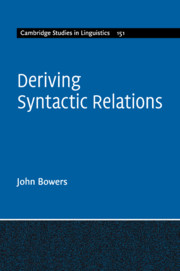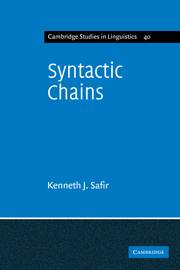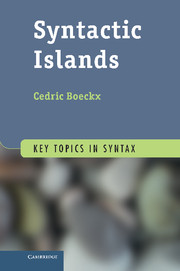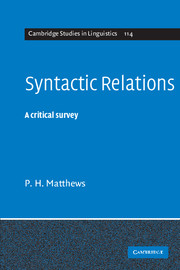Deriving Syntactic Relations
$41.99 USD
Part of Cambridge Studies in Linguistics
- Author: John Bowers, Cornell University, New York
- Date Published: December 2017
- availability: This ISBN is for an eBook version which is distributed on our behalf by a third party.
- format: Adobe eBook Reader
- isbn: 9781108548144
Find out more about Cambridge eBooks
$
41.99 USD
Adobe eBook Reader
Other available formats:
Hardback, Paperback
Looking for an inspection copy?
This title is not currently available on inspection
-
A pioneering new approach to a long-debated topic at the heart of syntax: what are the primitive concepts and operations of syntax? This book argues, appealing in part to the logic of Chomsky's Minimalist Program, that the primitive operations of syntax form relations between words rather than combining words to form constituents. Just three basic relations, definable in terms of inherent selection properties of words, are required in natural language syntax: projection, argument selection, and modification. In the radically simplified account of generative grammar Bowers proposes there are just two interface levels, which interact with our conceptual and sensory systems, and a lexicon from which an infinite number of sentences can be constructed. The theory also provides a natural interpretation of phase theory, enabling a better formulation of many island constraints, as well as providing the basis for a unified approach to ellipsis phenomena.
Read more- Simplifies syntactic theory by eliminating a redundant and unnecessary layer of syntactic structure
- Derives sentence structure from combinations of just three basic relations, thus reducing to a bare minimum the primitive nature of syntactic theory
- Predicts the range of cross-linguistic word order variation by means of a simple, incremental spell-out operation, along with language-specific directionality parameters
Reviews & endorsements
'This book challenges assumptions that have gone unquestioned for too long, while hewing to the core principles of the Minimalist Program. It will be useful and thought-provoking to generative syntacticians of all theoretical persuasions.' Elizabeth Cowper, University of Toronto
Customer reviews
Not yet reviewed
Be the first to review
Review was not posted due to profanity
×Product details
- Date Published: December 2017
- format: Adobe eBook Reader
- isbn: 9781108548144
- availability: This ISBN is for an eBook version which is distributed on our behalf by a third party.
Table of Contents
Introduction
1. Relational derivation
2. Types of lexical projections and arguments
3. Modification
4. Variation in word order
5. The role of morphology
6. Operators
7. Ellipsis
8. The DNA of language
References.
Sorry, this resource is locked
Please register or sign in to request access. If you are having problems accessing these resources please email [email protected]
Register Sign in» Proceed
You are now leaving the Cambridge University Press website. Your eBook purchase and download will be completed by our partner www.ebooks.com. Please see the permission section of the www.ebooks.com catalogue page for details of the print & copy limits on our eBooks.
Continue ×Are you sure you want to delete your account?
This cannot be undone.
Thank you for your feedback which will help us improve our service.
If you requested a response, we will make sure to get back to you shortly.
×






